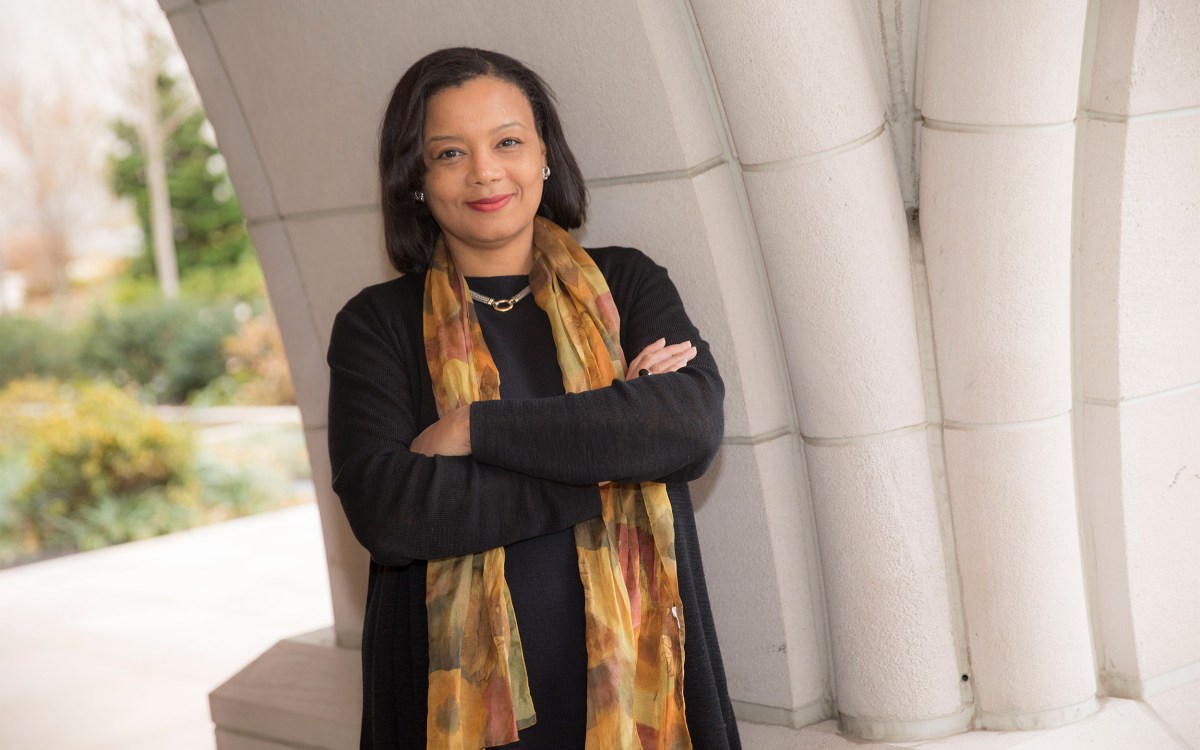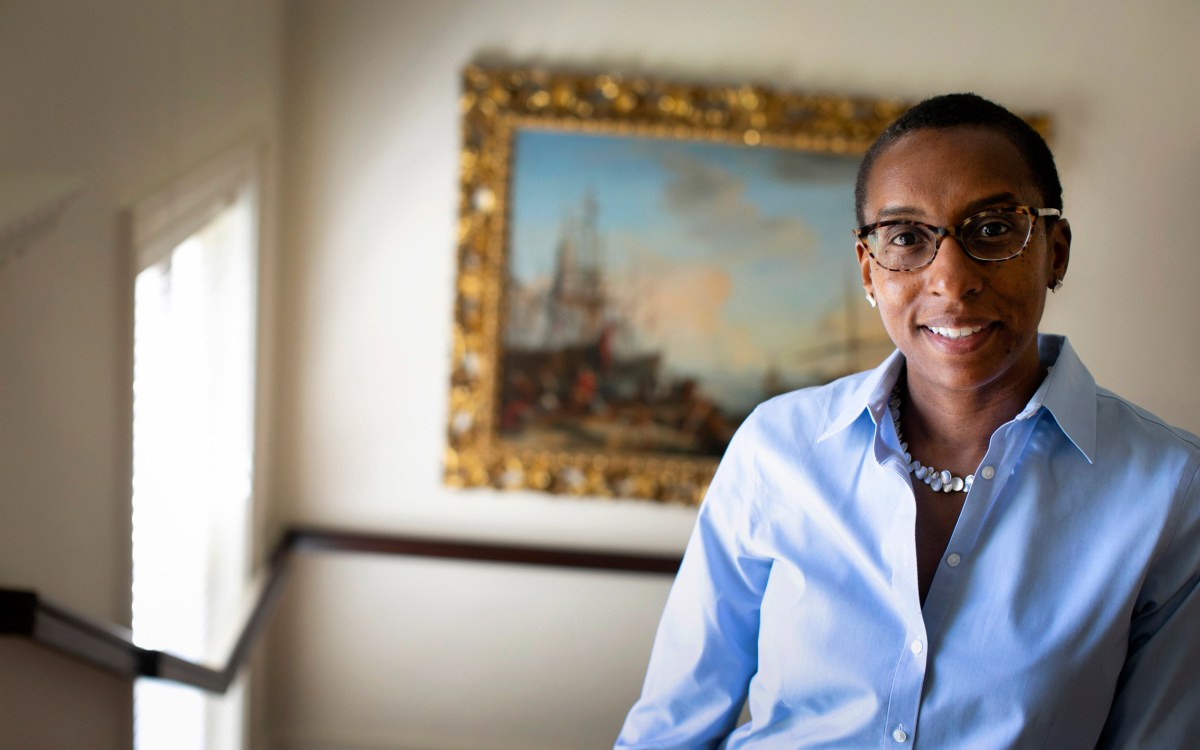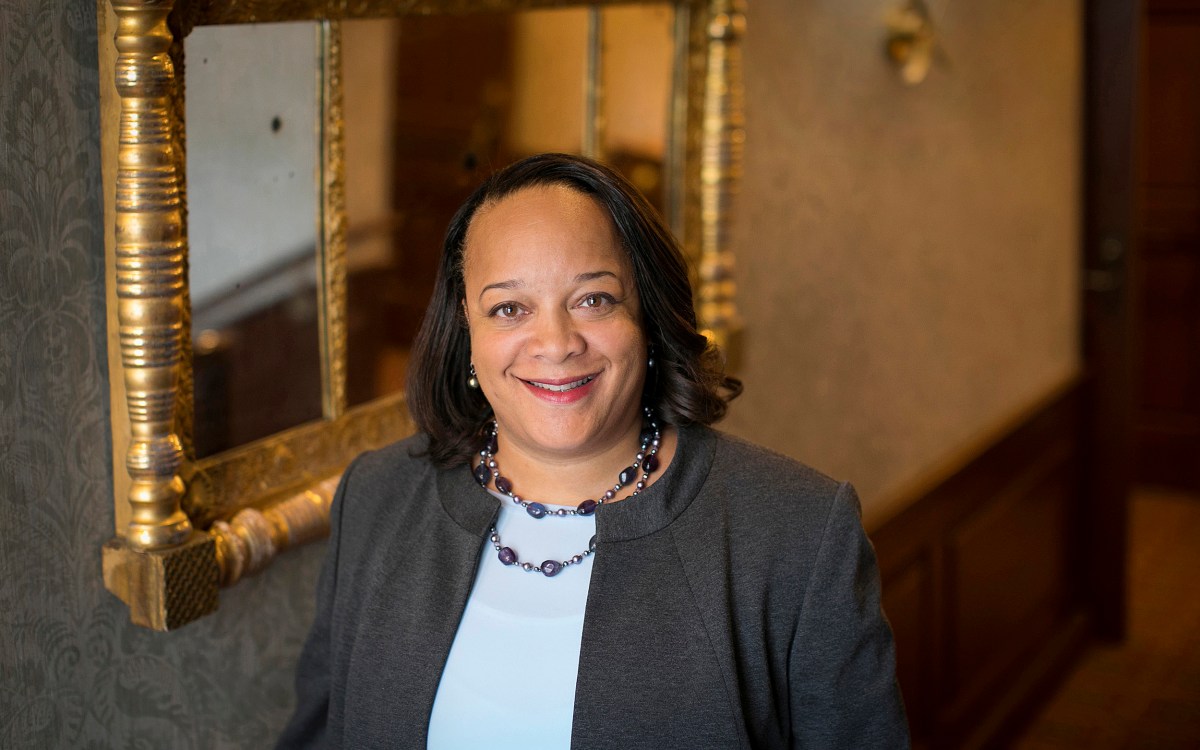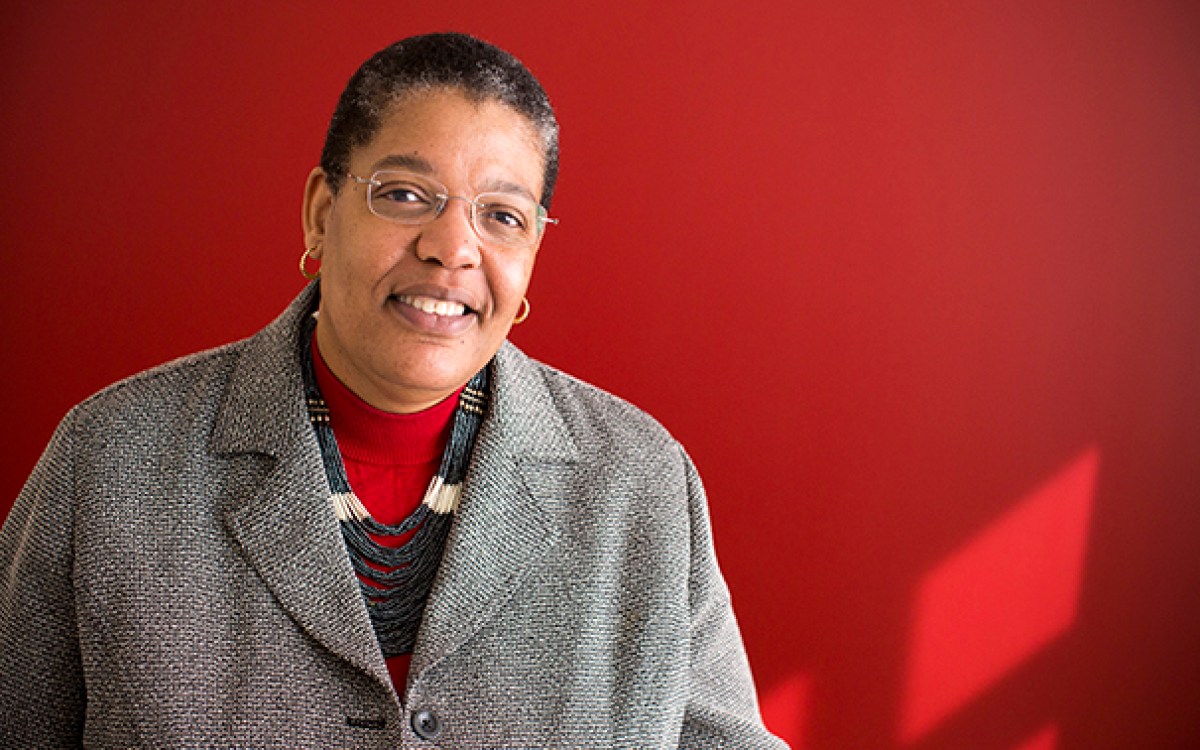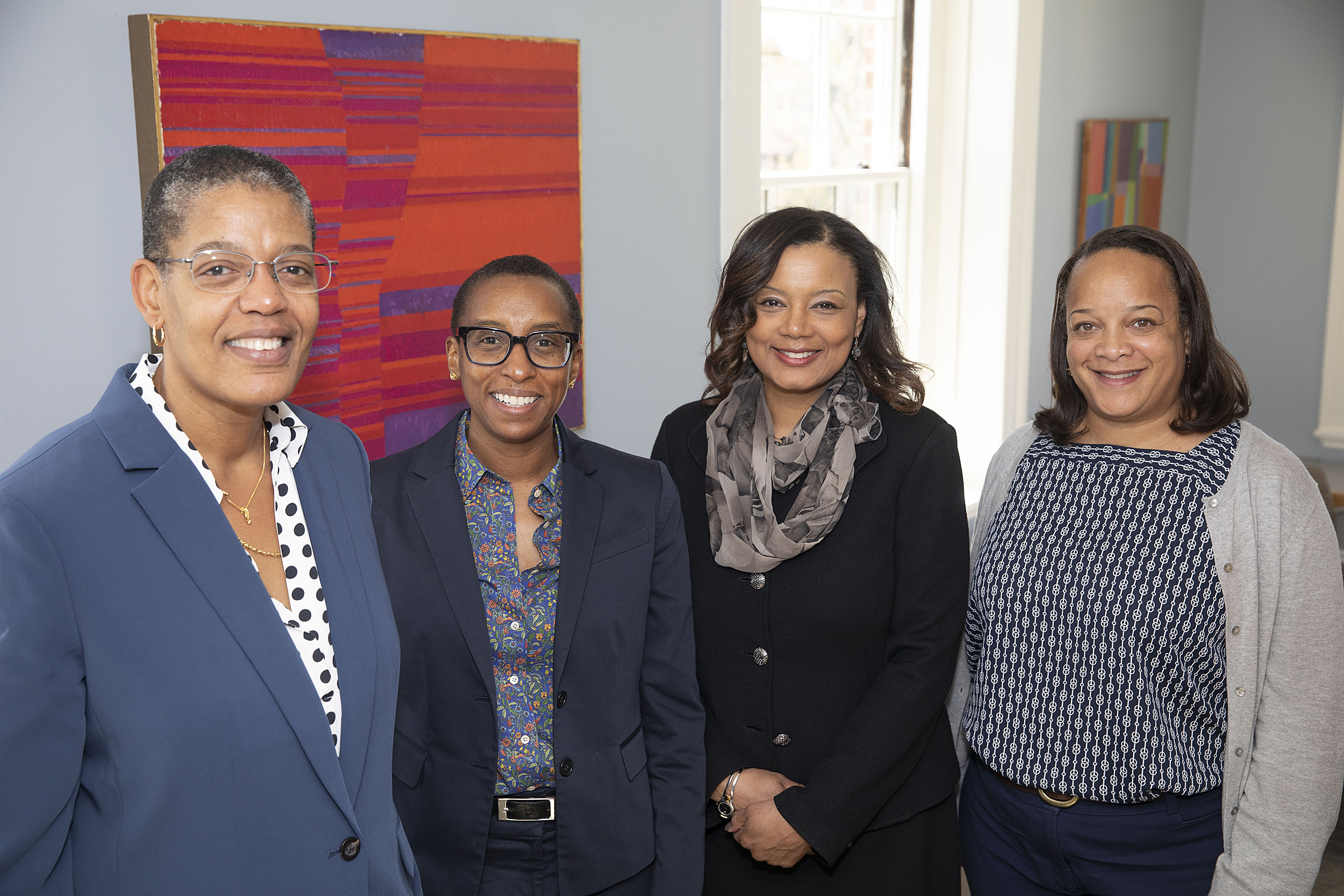
Michelle Williams (from left), Claudine Gay, Tomiko Brown-Nagin, and Bridget Terry Long get together to discuss their experiences as Harvard deans.
Kris Snibbe/Harvard Staff Photographer
Four deans, and their journeys
In a group interview, Brown-Nagin, Gay, Long, and Williams recall their role models and describe the complexities of leading their Schools
The Gazette sat down recently for an in-depth interview with four Harvard deans, Tomiko Brown-Nagin, dean of the Radcliffe Institute for Advanced Study, Claudine Gay, Edgerley Family Dean of the Faculty of Arts and Sciences, and Bridget Terry Long, dean of the Graduate School of Education, who were all named to their posts in 2018, and Michelle Williams, who became dean of the T.H. Chan School of Public Health in 2016. The wide-ranging discussion focused on topics that included their personal inspirations, their thoughts on leadership, and their efforts to support one another.
Q&A
Tomiko Brown-Nagin, Claudine Gay, Bridget Terry Long, and Michelle Williams
GAZETTE: Dean Williams, as the longest-serving dean here, is there any piece of advice you would give your colleagues?
WILLIAMS: Not advice but gratitude that we have the four of us and that instantly we connected. Having my colleagues here makes the job a lot less lonely because we can really come together and talk, commiserate about the transition from being on the faculty to being dean, but also have an honest check-in. That’s been a real joy for me.
GAZETTE: In a recent Q&A with the Gazette, Dean Long, you mentioned the importance of seeing the example set by Ruth Simmons, an administrator at Princeton who became the president of Brown and the first African American woman to lead an Ivy League institution. Can you all talk a bit about the importance of having models to look up to?
BROWN-NAGIN: I can certainly say that Ruth Simmons and [Wellesley College President] Paula Johnson, these are people whom I look up to, as I did to Drew [Faust, Harvard president emerita and Lincoln Professor of History], who I think is a beacon for all of us and who was certainly a trailblazer. It’s important to have people who can show you what this looks like, that it can be done, that one can be successful. I think it’s invaluable to have those people around.
GAY: I’d say the same in terms of people whose presence allowed me to imagine possibilities that I had not entertained before. Drew for sure, Ruth for sure, Michelle for sure, and that has made a really big difference. I have also been struck by how few have really had this opportunity, so even as I was able to imagine this because there were at least some people who were embodying a possible future, I also realized that it’s not an obvious path for me.
LONG: When I spoke about Ruth, and when I think about my interactions with Drew, it’s not just seeing the model — it’s also speaking to them one-on-one and hearing about their pathways. When you meet them as real people, you find out about the questions, the struggles, the progress, all the small wins and so forth that have led them on their path. It’s helpful not just to see what the end can look like, but how you get from point A to point B. And I think that has also been important for the four of us because sometimes you might see the surface, such as the announcement of some great initiative. But when it’s just the four of us, we can ask, “How did you do that?” Because there’s always a story behind the story.
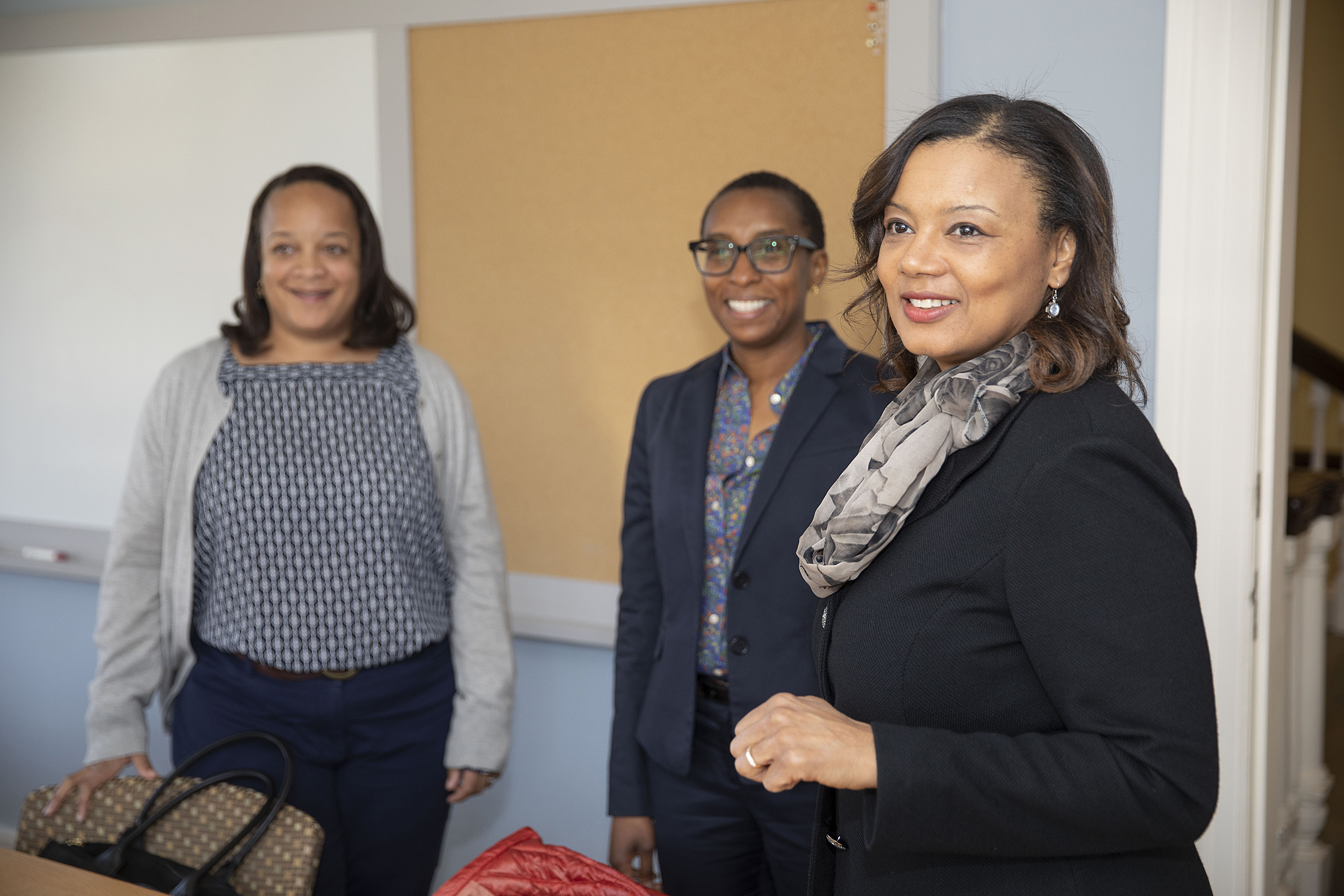
Bridget Terry Long (from left), Claudine Gay, and Tomiko Brown-Nagin meet in Fay House.
Kris Snibbe/Harvard Staff Photographer
GAZETTE: Do you see it as part of your mission to inspire students and younger academics to aim high?
WILLIAMS: Absolutely, I think it’s part of our obligation. And I think we have to do our work and conduct ourselves in ways where everything that we do is being observed, even when we think it’s not being observed. Our behavior is forming that template for the next generation.
I want to expand the conversation about Ruth and the others whose shoulders we stand on, beyond academia. I’m reading Cecile Richards’ memoir, which mentions Barbara Jordan. I remember as a kid looking across and seeing what she was doing when she [ran for president], not seeing backup for this, as well as seeing Ann Richards become the governor of Texas. So, I think our sources of inspiration come from our colleagues in academia but also those in the political space and in science and in other areas, and we have to look everywhere because there are so few of us.
BROWN-NAGIN: Just to amplify the point Bridget was making about having role models, but also seeing the struggle and the behind-the-scenes: As to the question of whether we serve as role models, certainly that’s true. But if I have conversations with my students, I emphasize the building blocks, the journey, the path, the struggle. Because if you don’t do that, you create this myth, this false sense of what one must be and how one must go about achieving any professional goal. I think that it’s really important to be honest and say that what one sees is not really the full picture of life as an academic, as a woman of color academic, as a woman.
“We have the common experience of knowing that these jobs are like running a marathon. It requires so much of you intellectually. It requires a level of stamina and patience. …”
Tomiko Brown-Nagin
LONG: That’s key. I feel this started during my many years as a faculty member. You have these amazingly talented students who come into your office who are selling themselves short, who don’t believe or don’t realize that they have what it takes to succeed in so many different ways in whatever pathway they choose. For years as a faculty member I feel it was really about capturing that talent, bolstering it, helping students really understand what their potential is. As a dean, it’s really a different perch and there is more visibility but there is still that same instinct, not so much to be a role model, but to help others see the tremendous potential that they already have.
GAY: I couldn’t agree more. In a lot of ways, I do see this as an extension of work that we have been doing as faculty and senior faculty for a long time. And I’d like to think this is a modest goal, but if one of the things our presence achieves is to affirm the sense of belonging for a larger group of students and faculty, I think that would be pretty terrific. And if just the fact that we are in these roles allows people, even those we don’t engage with directly, to imagine new possibilities for themselves, I think that would be wonderful.
There is also our impact on how the world sees Harvard. I think there are many people in our community who probably are not that surprised by the fact that we are leaders at Harvard because we’ve seen Harvard changing for a while. But it does run counter to the broader popular narrative about what Harvard is, what Harvard looks like. So, if we can be part of projecting a new vision of Harvard, I think that also would be a tremendous legacy for all four of us.
WILLIAMS: That message is powerful, Claudine, because I was just in Ethiopia and had a young faculty member from Addis Ababa University come up to me. She had read the narrative about the four of us as deans and told me that’s a source of inspiration for her. So, it’s that powerful message that really goes across the transom to others outside of the country.
GAY: Exactly. Again, even with people we are not engaged with directly.
GAZETTE: Do you check in with one another regularly?
“Having that North Star guiding principle that is clear in what you do and how you serve. I think it’s really important for that to be visible to others.”
Bridget Terry Long
GAY: We have been pretty good so far, having regular meals together every few months. That’s been good. There are also more structured forums where we interact with all the other deans and manage to have conversations on the sidelines.
WILLIAMS: And because we have those regular gatherings, when we do need a quick check-in we have that connection already so that quick check-in can happen pretty efficiently.
BROWN-NAGIN: That’s right. I can remember sending an email to my colleagues about an issue I was facing, and I felt bad because I get emails all the time and it’s so hard to respond to something in the moment, and yet they all did.
WILLIAMS: Because we have given one another the license to do that, knowing the piles of emails we get.
GAY: Right, we know it must be important if she is sending an email.
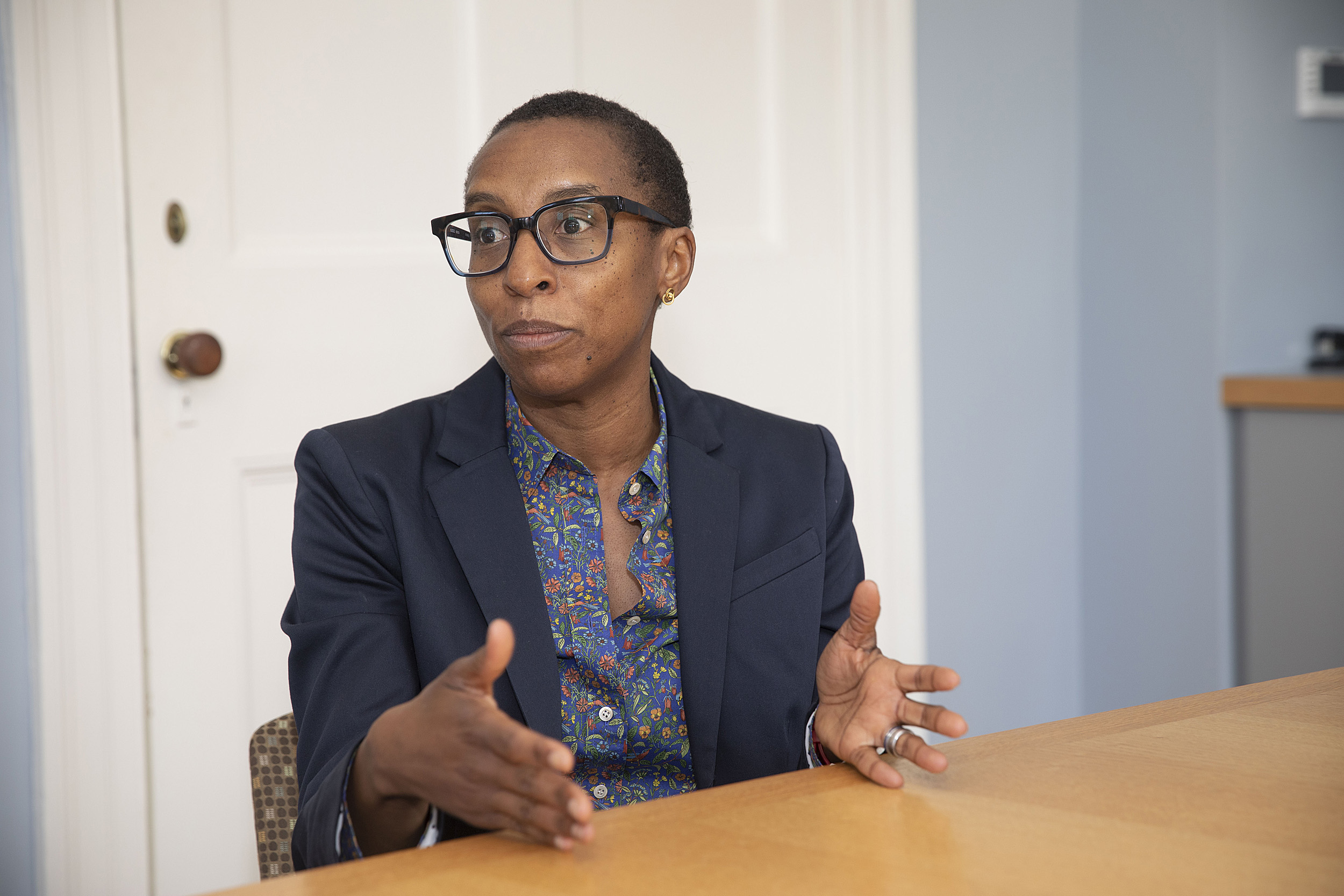
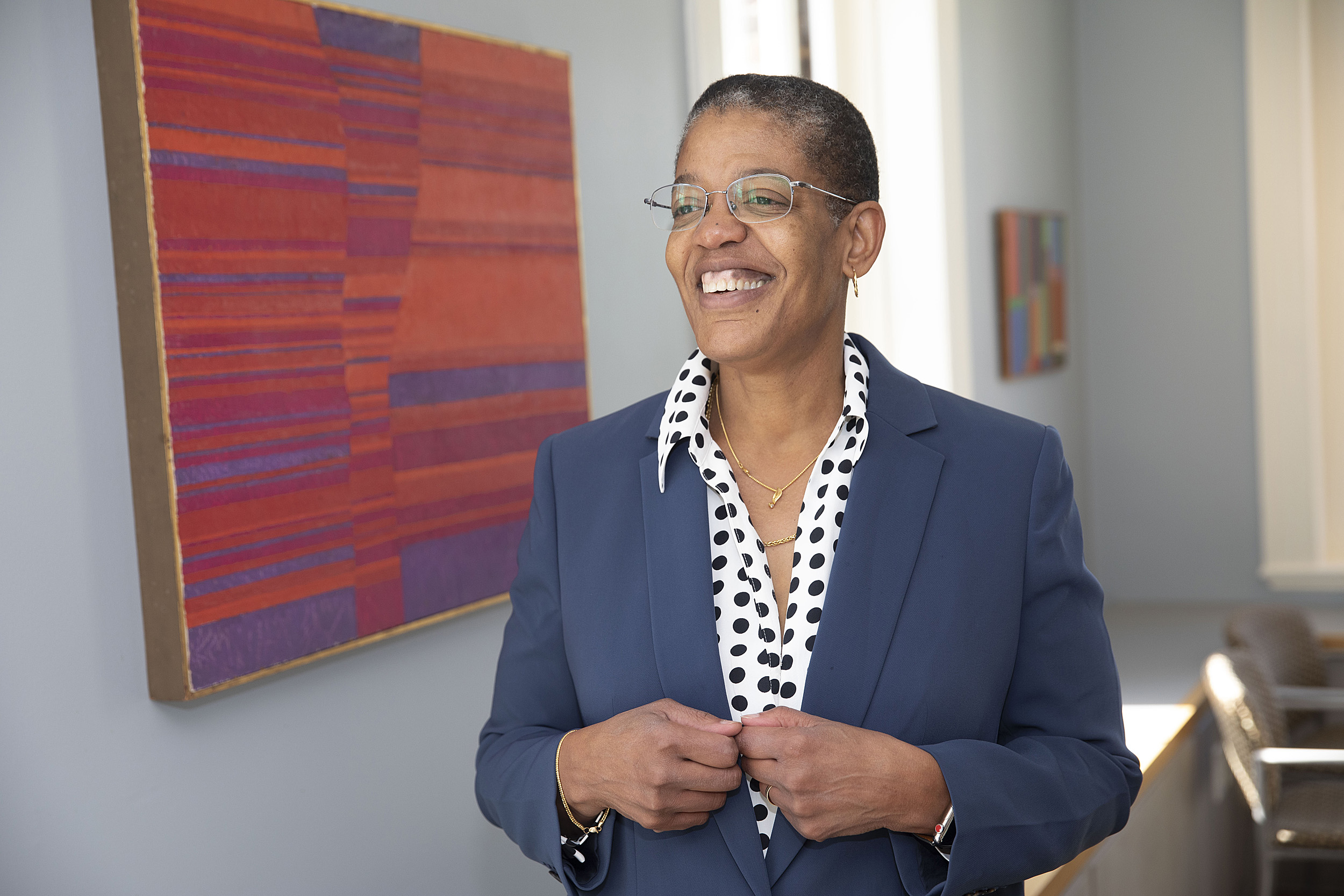
Claudine Gay and Michelle Williams speak about the challenges and rewards of serving as deans.
Kris Snibbe/Harvard Staff Photographer
LONG: We also feel safe to say in those exchanges things like, “Wait, did that just happen?”
GAY: Right, “Help me decode this. I think this is what just happened but I am not positive.”
LONG: And it’s not to say that it’s just the four of us. There are other deans as we build our relationships — and we are all going through this together — that I’ve reached out to from time to time, or sent a note of support because you know something is going on in their School. But we are a special group.
GAY: That has been an unexpected part of this experience, feeling the camaraderie and sense of community among all of the deans across the Schools. I feel it’s one way in which One Harvard is a reality and not just an aspiration. There’s this immediate bond that exists because our situations are so similar. And within our own little context we might feel quite alone, but actually if we manage to look up and around we realize that we’ve got this incredible bench.
WILLIAMS: I would say that was my first and biggest surprise. With all the rhetoric about the competitiveness of the different Schools and the leaders of the different Schools, you walk into this room with all of the deans and we couldn’t be more of a support group for one another.
GAY: Yes, sometimes it feels like therapy.
BROWN-NAGIN: Because we all have monumental challenges. We have the experience of dealing with surprises virtually every day.
LONG: Yes.
WILLIAMS: What time is it?
(Laughter.)
BROWN-NAGIN: And we have the common experience of knowing that these jobs are like running a marathon. It requires so much of you intellectually. It requires a level of stamina and patience. So it’s wonderful to have the context of the organized academic council to commiserate, and also these wonderful women.
GAZETTE: Talk to me a little bit more about the notion of silos at Harvard. How do you navigate between doing what is best for your School and being a good University citizen?
“If we can be part of projecting a new vision of Harvard, I think that also would be a tremendous legacy for all four of us.”
Claudine Gay
BROWN-NAGIN: One thing I will say is that Radcliffe is a little different in that respect. It’s positioned a little differently, as Harvard’s convener. We are the place that brings together all of the units, all of the Schools, and I think [that] adds a lot of value across the University. So, I don’t feel that pressure in quite the same way as others might. I feel like what we are trying to do here is create a space for cross-disciplinary conversations, and we really believe that if one is going to solve big problems, one has to have perspectives from all the disciplines, from all the professions. That’s one thing that really attracted me to this post and that makes it feel really special.
LONG: I think from my perspective as a dean there are so many things coming at you, and you have to decide what the priorities are and what things you need to take care of now versus what you can take care of later. There are lots of opportunities and lots of ideas but limited time and resources. So when you bring in the piece about the University there are opportunities that come not from a sense of responsibility but a sense of, “Wow, wouldn’t it be amazing if we linked to this and this and the work would all be better and the students would be better supported?” It’s just a matter of sorting through all of the possible opportunities and prioritizing, and knowing there’s nothing we can do by ourselves as deans. It’s about having your faculty, your staff, your students really be engaged in some kind of organic way. So, it’s a matter of seeing where there are opportunities that address some need where everyone wins. But I just think it’s hard. I am in my first year — and you have to tell me, Michelle, if this is going to be true — but I think it’s just sorting through and choosing where to spend your time and which opportunities to develop.
WILLIAMS: I would add that this is where true leadership is tested, because this is an amazing institution because of the diversity and the depth of the Schools and the academic, service, and teaching work that happens across this very vast landscape. One has to not be in the position of being adversarial around priorities but actually try to sequence and time them so we are never approaching a “no,” we are saying “Yes,” or “Yes, in a while,” or “We have something even better.” I think working in that space it doesn’t feel competitive, it feels like we are managing all of our assets in ways to enrich every part of the University that continues to make us, as Drew used to say, “the University of universities.” It requires leadership, but I think we all recognize that we are operating in an academic landscape where that is a good challenge to have.
GAY: I totally agree. Mainly I see it as opportunities to collaborate. I realize that we are in a long-term relationship and a long-term conversation and that there may be moments where the School’s needs have to be front and center and determinative, and others where it’s not that the School has to do things that are at odds with its interests or mission but that some other considerations also have to be brought to bear in the decision-making. And I think if you can take that long-term intertemporal perspective, then the tension really doesn’t feel like a tension.
WILLIAMS: That’s where the leadership and the communication skills really become very important. It’s trying to get everyone to appreciate that context.
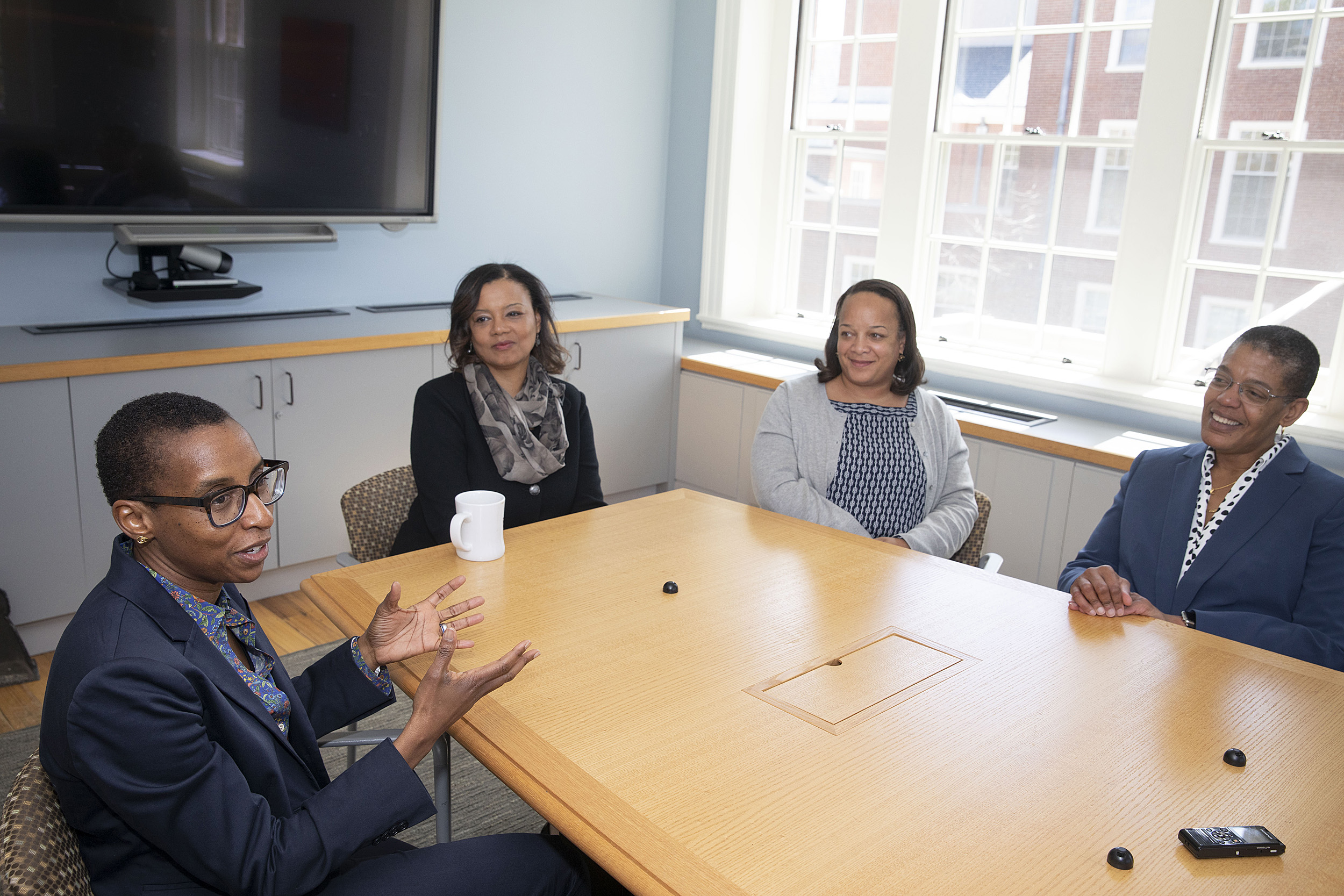
Claudine Gay (from left), Tomiko Brown-Nagin, Bridget Terry Long, and Michelle Williams chat about leadership, how to prioritize, plus what they do to unwind away from their responsibilities.
Kris Snibbe/Harvard Staff Photographer
GAZETTE: Your different Schools touch on so many different topics with lots of overlap. Do you come together to talk about collaborations, and working in tandem to try to solve some of the pressing problems facing the world?
GAY: Not enough. I’d like to think this is just a first-year problem. At some point I will get the shape of the job, I will have my system for triaging crises and then I can turn to the important intellectual work that motivated me to take this role. So, I’d like to think that’s going to happen because those are the conversations I would love for us to be spending more of our time on. The honest answer at this point is that we are not engaging as much on those terms as we hope to going forward, as much as we all want to. As you say, there are so many overlapping areas, and ways that we are going to be able to collaborate, and our faculty are already collaborating.
WILLIAMS: Our students are also doing it. The biggest joy was walking down the street last week and meeting a student who had just come from the Ed School campus with her mom, who is an educator in California. They were just beaming. The student is finishing her master’s in public health degree and is then going back to medical school to finish her final year. She told me that her academic experience between the Ed School and School of Public Health was so transformative that she is now deciding on a different way to plan her residency so that it will involve education with children with special needs. And I was like, “Yay!”
(Laughter.)
WILLIAMS: So more of that.
LONG: I know as a faculty member the connections that I had all over the University, but I am learning what exists throughout my School. We’ve had some opportunities and there are some collaborations already going on between the Ed School and the School of Public Health. This has felt like a year of first needing to get a lay of the land and getting certain things moving, but I have this file of ideas I’d like to come back to from which I pick a thing or two and keep moving it forward or deepening something that already exists. It’s not something we have to start from scratch.
“One has to not be adversarial around priorities but actually try to sequence and time them so we are never approaching a ‘no,’ we are saying ‘Yes,’ or ‘Yes, in a while,’ or ‘We have something even better.’”
Michelle Williams
BROWN-NAGIN: I think that is exactly right. I will say it’s very much a part of my vision to think about the ways universities can contribute to problem-solving for many of the pressing issues in the world today. I really do believe that that is something that we can do more of as we strive toward impact. I feel it’s not enough to have conversations just on campus among intellectuals and even with students. I think it is really important to look out and find ways to be of value to the world, and that is certainly something that I hope for Radcliffe in the future. I am so happy to have in my circle scholars who are similarly public-minded and service-oriented, and I think that over time we can certainly make it happen in all sorts of ways.
GAZETTE: What makes a great leader?
GAY: I heard someone say stamina at one point.
WILLIAMS: Stamina is key.
BROWN-NAGIN: Communications skills and the ability to build relationships and know how that’s done. To provide feedback while also inspiring people to be their best — staff members and other faculty — those are some of the things I’ve been thinking about.
WILLIAMS: You’ve got to be committed to service. I think we would all say that this is all in service to X or Y.
LONG: Having that North Star guiding principle that is clear in what you do and how you serve. I think it’s really important for that to be visible to others. And know the community that you are serving. That’s part of building the relationships, knowing when and how to communicate. It’s all those pieces.
GAY: I can’t underscore enough the importance of communication. It’s not only the ability to communicate but the willingness to communicate and to explain why you are making the decisions you are making, whether in a one-on-one conversation or in a large group. It’s so critical. I am guessing it’s always been important but we are also at a moment where there are such low levels of trust, it’s impossible to rebuild that trust without being able to communicate.
WILLIAMS: I think this is a really important moment in time that impacts how we lead and the context in which we are leading. It is a time where there is pervasive or diminishing lack of trust in institutions. And I think that has actually impacted our everyday lives as leaders.
GAY: The other thing I would say, and this is picking up on what you just said, Bridget, [is] that you need to have your North Star. That is so important because not only are lots of different agendas coming at you all the time and you’ve got to decide what agenda you want to own versus what agenda probably belongs to someone else, but lots of different value systems are coming at you all the time. People are telling you how you should be looking at a situation, and you’ve got to be pretty clear about your own value system and pretty committed to applying that consistently across all the different decisions that are coming at you. Because there are lots of people who would be happy to frame and reframe the choices all the time.
LONG, BROWN-NAGIN: Yes, all the time.
WLLIAMS: And dictate the timeline. So you have to learn to hit that pause button.
LONG: And when you have that North Star, it doesn’t feel like an ad hoc, willy-nilly decision; there’s a consistency that people start to see that can build trust, but it also helps you sleep well at night. You know that this is what I set out to do, this is what I am willing to do, this is what I stand behind, and as long as I am holding dear to those principles, those values, that’s all that I can give.
GAY: I still can’t sleep but …
(Laughter.)
LONG: Last night was the third night this year and I have been a good sleeper forever.
BROWN-NAGIN: It definitely keeps you up at night.
WILLIAMS: My husband says I talk in my sleep, “What faculty meeting were you in?”
(Laughter.)
BROWN-NAGIN: Oh, I take notes through the night.
LONG: I send myself emails at 2 or 3 in the morning just to get the idea out. So maybe what we need is stress management.
WILLIAMS: Sleeping coaches.
LONG: Claudine and I got together last week and I think at the end I said, “What are you doing for yourself?” I think you started talking about work and I said, “No, what are doing for yourself?” I told you I didn’t have an answer for you, but that I was just going to remind you.
GAY: I said, “I will get back to you on that one.”
(Laughter.)
GAZETTE: It seems like you all have a lot of fun.
WILLIAMS: You’ve got to laugh.
GAZETTE: Do you get together outside of Harvard?
GAY: This summer.
LONG: That is always what an academic will say: “In summer we will get together, I will write that book, I will do that grant proposal.
WILLIAMS: And then August comes along.
GAZETTE: Thanks so much for taking part in this conversation. Is there anything else you’d like to add?
GAY: These women are awesome.
WILLIAMS: I agree.
BROWN-NAGIN: So affirming.
WILLIAMS: Never in a million years would I have expected that we would have this cohort.
LONG: Yes, you were by yourself.
GAY: I just feel so fortunate to be serving at this moment because of them. It makes a big difference.



